I've made a graphical calculator app using the Processing Development Environment and have incorporated a Java Operation class. Then I called instances of the Operation class in my main file - calculator.pde. When I call the method on the multiple instances, conditionally, it prints output from the method multiple times because of the loop and conditional from which the method is called.
Here's the calculate() method of Operation class:
String calculate() {
int operationIndex = userInput.indexOf(operationSymbol);
ArrayList<String> clickedNumbers = new ArrayList<String>();
System.out.println(operation + " index: " + operationIndex);
for (int i = 0; i < operationIndex; i++) {
clickedNumbers.add(userInput.get(i)); }
double double1 = calculator.stringToDouble(String.join("", clickedNumbers));
System.out.println("double1: " + double1);
clickedNumbers.clear();
int equalsIndex = userInput.indexOf("=");
for (int i = operationIndex + 1; i < equalsIndex; i++) {
clickedNumbers.add(userInput.get(i));
}
double double2 = calculator.stringToDouble(String.join("", clickedNumbers));
System.out.println("double2: " + double2);
Double operResult = this.doOperation(double1, double2);
String operationResult = calculator.doubleToString(operResult);
System.out.println("Operation Result: " + operationResult);
return operationResult;
}
All System.out.println() statements depend on local variables inside the method. These are what should be printing out to the console only once. Whenever the user puts in an operation and presses equals, for example, if s/he inputs 15 * 3, it outputs:

Above, the highlighted part of the console output is my desired output.
Here is my code where the calculate() method is called:
String[] numberStr = {"1", "2", "3", "4", "5", "6", "7", "8", "9"};
Boolean pressedEquals = listName.contains("=");
for(String number : numberStr) {
Boolean pressedNumber = listName.contains(number);
if (pressedNumber && pressedEquals) {
if (listName.contains("+")) {
processStatement = "Adding Numbers...";
result = addition.calculate();
}
else if (listName.contains("-")) {
processStatement = "Subtracting Numbers...";
result = subtraction.calculate();
}
else if (listName.contains("*")) {
processStatement = "Multiplying Numbers...";
result = multiplication.calculate();
}
else if (listName.contains("/")) {
processStatement = "Dividing Numbers...";
result = division.calculate();
}
else if (listName.contains("%")) {
processStatement = "Modulufying Numbers...";
result = modulus.calculate();
}
else if (listName.contains("^")) {
processStatement = "Expounding numbers...";
result = exponential.calculate();
}
}
}
I don't understand why it is printing output as many times as the length of the userInput ArrayList. I know the problem is the pressedNumber Boolean in the for loop. I know the OP on this question had the same problem, with it the printing a number of times depending on a length of user input, but the answer to the question did not explain why it was doing this.
Research and Trials that didn't work
Part of fixing this was making the processStatement into a variable because earlier I just printed it inside the condition. This didn't work because it printed multiple times. I cannot do this for the println statements inside the method because they depend on the variables inside the method, and there are quite a few statements. My second plan was to make a static method printInfo(), but this also wouldn't have worked because of the variables being too tightly scoped, and I can't define them outside because then that would be inaccurate.
Update
I have looked more on stack overflow, this time for regular expressions, and these questions added to my research to solve this problem:
- This one for making the regular expression that I am looking for
- This question for checking if the expression matches the regular expression
- This question to extract a part of the
regExfor later code (my control flow) - The answer to this question that makes characters with special meaning be used as regular characters by prepending them with
\\